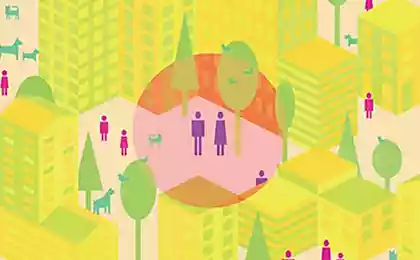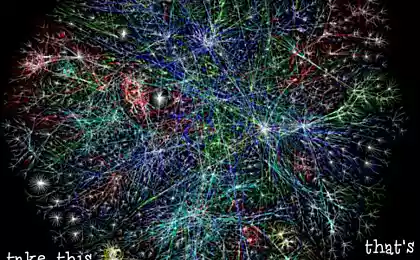785
Why I stopped reading, listening, watching the news
Make a conscious choice what you readI am convinced that reading the news is much worse than not reading anything. There is no evidence that it makes us wiser, helps make decisions, makes more informed citizens. Nothing of the sort — quite the contrary.
Fifty two million seven hundred ninety six thousand six hundred fifteen
If you are like me, then you have stopped to absorb the news. Perhaps you did it unconsciously.
Perhaps you felt like your optimism pulled out of you with each fresh news, and pulled away without even noticing it. You have found the best way to spend time and began to replace this news. Or you have never been a fan of the news.
Whatever the reason — I bet you are bored and perhaps even understand that they don't need the news at all.
"Happy are those of us who realized the danger of living with an overabundance of food and began to change my diet. But most still don't understand that news is to the mind is the same as sugar for the body."Rolf The Dobelle
I've been meaning to write on this topic. Largely because I was disappointed in the men who consider themselves highly cultured just because I read the Newspapers and know what's going on in the world. And these women who know everything about all the celebrities and are surprised when they hear that I do not know, for example, about the leak photos Jennifer Lawrence. But mostly because I only benefit from this.
From the moment I passed out from the news, I better control my attention (I decide what thoughts I want to be surprised), I have improved reading skills (I'm looking for and enjoying a long, leisurely read, thought-provoking), I have more time to gain meaningful ideas and I definitely became more optimistic.
I decided to do some research on this topic and was amazed at what I found more than enough evidence of his thoughts. I expected to find arguments that reading the news more inappropriate, deceiving, manipulating us and simply eats up time, but whether it is toxic for our body? Changes to the structure of our mind? If killing creativity? Increases the number of intellectual errors, and suppresses thinking?
Rolf the Dobelle said that, in fact, we pay not so much attention a long, deep, intellectual, calm and steady reading (which is really important and demands mental work), while our brain pays much more readily draws attention to the flashy content, stories filled with drama, graphic design, located in a prominent place. This is the reason we can swallow limitless quantities of news, they are like colorful candy to our mind.
Such techniques are found not only in the news area, this same technique of attracting attention used almost everywhere — from government propaganda and corporate marketing. We see this on Facebook and Twitter, every post "shouts" in an attempt to attract our attention, not so much at how much luring us to click on.
"Information is no longer a scarce commodity, in contrast to attention. Why we give it so easily?" Rolf The Dobelle
During the paid-by-the-piece articles, generating income from clicks of the mouse, when attractive headlines is more important than the content, and when anyone can call themselves "journalist", we should be circumspect about what we read, and should be aware of possible negative consequences, to which we and our society can allow such a reading.
Forty eight million nine hundred seventy thousand seven hundred fifty seven
It is known that the adult human brain retains neuroplasticity.It means he has an incredible ability to adapt and to literally change its structure and functionality as the result of experiences, environment and behavior. It is worth considering: after all, we spend so much time during the day to skim the photos, videos, titles, and relevant; scrolls, click, follow links. Our brain have to form a short connection to cope with overload and distractions caused by such a large amount of information, because on top of that we often become consumed news at the time as doing something else. We read the newspaper during Breakfast, listening to the news at the time, like go in the car and think about plans for the next day, watch the news in fits and starts, while flicking channels, being the Twi-tape, sitting at work.
We are teaching our brain to not focus on the content and regularity, to perform tasks, giving them only part of his attention. News scatter our attention and affect perception, and the more we consume them, the more we reinforce the habit.
And despite the fact that this in itself sounds terrible, I think it is not important, what we should worry about.For me the most dangerous — is negative. I really believe that we underestimate the impact of negative content articles in individual and collective consciousness of our world. James Clear well expressed this thought: when you have an overdose of information that you just can't cope, it's easy to understand why people say things like "it's a complicated world" or "we need to do something with it." Why expend the effort when everything seems out of control?
"I'm fed up with this cheap way to "explain" the world. It's inappropriate. It's irrational. It's a fake. And I will not allow it to pollute my thoughts»Rolf The Dobelle
Poverty, hunger, murders, war, terrorism, accidents, celebrity gossip. I have no need to know these things. You too. I know you can put that news important to inform us about the world, but first ask yourself these questions. Do it in any way improves your life? It affects you personally? Your family, business or career? True if this view of our world? It pushes you to thoughts or actions? Think about it. Over the past year, some news changed your life? If you have not read the news, your personal or professional life would have been different?
Imagine that you remember one the very article that was significant for your life. How many of you scrolled past to to stumble upon her? In the year, probably hundreds? Chiliad? It's not the best value. And don't you think that if the news was really important to you — in a personal or professional sense — you'd know her from colleagues, friends or family members?
Twelve million one hundred forty thousand four hundred eighty nine
Good exists everywhere.
We must seek it, speak about it and share it.Information is important only when it helps us to create, to build, to share or to experience something unforgettable. The world doesn't need passive, but informed people, he needs an active, well informed people. Go deep into the subjects that you are really passionate about.
Think about the solution, not the problem.
If your head is filled with thoughts about how you can die, or that something can go wrong, you are able to think about how to live and what and how should be done. If you want to know about the problem, it should be only because you are thinking about the solution. All problems are difficult, the only way to solve or to understand them is to dive into the study books and long magazine articles. Solve only those problems to which you can influence.
Be aware, and not informed.
Read books, magazines, smart articles, watch TED talks and inspiring videos or listen to podcasts. Don't be afraid not to know the latest relevant news. This is just an easy excuse to start a superficial conversation. Be brave enough talking about really important things.
Make an informed choice of what you read.
We need more journalists who "dig" in the really important stories, not those that we always see on Facebook. We need people who see value only in material, meaningful, thought-provoking. Let your click, your time, attention and us support good content. published
Author: Lera Petrosyan
P. S. And remember, just changing your mind — together we change the world! ©
Source: interesno.co/myself/f14c9a099707
Fifty two million seven hundred ninety six thousand six hundred fifteen
If you are like me, then you have stopped to absorb the news. Perhaps you did it unconsciously.
Perhaps you felt like your optimism pulled out of you with each fresh news, and pulled away without even noticing it. You have found the best way to spend time and began to replace this news. Or you have never been a fan of the news.
Whatever the reason — I bet you are bored and perhaps even understand that they don't need the news at all.
"Happy are those of us who realized the danger of living with an overabundance of food and began to change my diet. But most still don't understand that news is to the mind is the same as sugar for the body."Rolf The Dobelle
I've been meaning to write on this topic. Largely because I was disappointed in the men who consider themselves highly cultured just because I read the Newspapers and know what's going on in the world. And these women who know everything about all the celebrities and are surprised when they hear that I do not know, for example, about the leak photos Jennifer Lawrence. But mostly because I only benefit from this.
From the moment I passed out from the news, I better control my attention (I decide what thoughts I want to be surprised), I have improved reading skills (I'm looking for and enjoying a long, leisurely read, thought-provoking), I have more time to gain meaningful ideas and I definitely became more optimistic.
I decided to do some research on this topic and was amazed at what I found more than enough evidence of his thoughts. I expected to find arguments that reading the news more inappropriate, deceiving, manipulating us and simply eats up time, but whether it is toxic for our body? Changes to the structure of our mind? If killing creativity? Increases the number of intellectual errors, and suppresses thinking?
Rolf the Dobelle said that, in fact, we pay not so much attention a long, deep, intellectual, calm and steady reading (which is really important and demands mental work), while our brain pays much more readily draws attention to the flashy content, stories filled with drama, graphic design, located in a prominent place. This is the reason we can swallow limitless quantities of news, they are like colorful candy to our mind.
Such techniques are found not only in the news area, this same technique of attracting attention used almost everywhere — from government propaganda and corporate marketing. We see this on Facebook and Twitter, every post "shouts" in an attempt to attract our attention, not so much at how much luring us to click on.
"Information is no longer a scarce commodity, in contrast to attention. Why we give it so easily?" Rolf The Dobelle
During the paid-by-the-piece articles, generating income from clicks of the mouse, when attractive headlines is more important than the content, and when anyone can call themselves "journalist", we should be circumspect about what we read, and should be aware of possible negative consequences, to which we and our society can allow such a reading.
Forty eight million nine hundred seventy thousand seven hundred fifty seven
It is known that the adult human brain retains neuroplasticity.It means he has an incredible ability to adapt and to literally change its structure and functionality as the result of experiences, environment and behavior. It is worth considering: after all, we spend so much time during the day to skim the photos, videos, titles, and relevant; scrolls, click, follow links. Our brain have to form a short connection to cope with overload and distractions caused by such a large amount of information, because on top of that we often become consumed news at the time as doing something else. We read the newspaper during Breakfast, listening to the news at the time, like go in the car and think about plans for the next day, watch the news in fits and starts, while flicking channels, being the Twi-tape, sitting at work.
We are teaching our brain to not focus on the content and regularity, to perform tasks, giving them only part of his attention. News scatter our attention and affect perception, and the more we consume them, the more we reinforce the habit.
And despite the fact that this in itself sounds terrible, I think it is not important, what we should worry about.For me the most dangerous — is negative. I really believe that we underestimate the impact of negative content articles in individual and collective consciousness of our world. James Clear well expressed this thought: when you have an overdose of information that you just can't cope, it's easy to understand why people say things like "it's a complicated world" or "we need to do something with it." Why expend the effort when everything seems out of control?
"I'm fed up with this cheap way to "explain" the world. It's inappropriate. It's irrational. It's a fake. And I will not allow it to pollute my thoughts»Rolf The Dobelle
Poverty, hunger, murders, war, terrorism, accidents, celebrity gossip. I have no need to know these things. You too. I know you can put that news important to inform us about the world, but first ask yourself these questions. Do it in any way improves your life? It affects you personally? Your family, business or career? True if this view of our world? It pushes you to thoughts or actions? Think about it. Over the past year, some news changed your life? If you have not read the news, your personal or professional life would have been different?
Imagine that you remember one the very article that was significant for your life. How many of you scrolled past to to stumble upon her? In the year, probably hundreds? Chiliad? It's not the best value. And don't you think that if the news was really important to you — in a personal or professional sense — you'd know her from colleagues, friends or family members?
Twelve million one hundred forty thousand four hundred eighty nine
Good exists everywhere.
We must seek it, speak about it and share it.Information is important only when it helps us to create, to build, to share or to experience something unforgettable. The world doesn't need passive, but informed people, he needs an active, well informed people. Go deep into the subjects that you are really passionate about.
Think about the solution, not the problem.
If your head is filled with thoughts about how you can die, or that something can go wrong, you are able to think about how to live and what and how should be done. If you want to know about the problem, it should be only because you are thinking about the solution. All problems are difficult, the only way to solve or to understand them is to dive into the study books and long magazine articles. Solve only those problems to which you can influence.
Be aware, and not informed.
Read books, magazines, smart articles, watch TED talks and inspiring videos or listen to podcasts. Don't be afraid not to know the latest relevant news. This is just an easy excuse to start a superficial conversation. Be brave enough talking about really important things.
Make an informed choice of what you read.
We need more journalists who "dig" in the really important stories, not those that we always see on Facebook. We need people who see value only in material, meaningful, thought-provoking. Let your click, your time, attention and us support good content. published
Author: Lera Petrosyan
P. S. And remember, just changing your mind — together we change the world! ©
Source: interesno.co/myself/f14c9a099707























